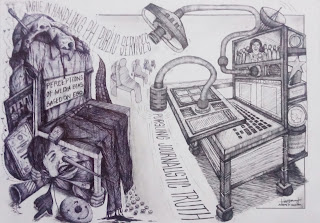COLUMN | Journalists should be biased, but only to the truth.
After declining to participate in GMA News’ Presidential Interviews, the camp of the presidential aspirant Ferdinand Marcos Jr. defended their absence by accusing the multi-award-winning journalist Jessica Soho of being biased and “anti-Marcos.” However, it is pretty ironic to call an internationally-acclaimed journalist like Soho biased when all her work is simply for the pursuit of truth.
In the Presidential Interviews, Jessica Soho showed no sign of predisposition. She questioned Manila Mayor Isko Moreno’s loyalty and populist character. She also asked Senator Manny Pacquiao about his vote-buying allegations and the P2.2 billion tax evasion case. Soho also challenged Sen. Ping Lacson after saying that his stance on the death penalty changed because of a Netflix movie. On top of that, the veteran journalist also sought Vice President Leni Robredo’s message to the people who discredited her “lugaw” movement. It’s clear that Soho displayed only veracity as she grilled every presidential candidate with the most challenging questions, genuinely doing her job as a defender of truth.
It’s unfair for the Marcos camp to call Jessica Soho biased when they were given a chance to clarify their stances. It’s hypocritical for them to point fingers when they have the opportunity to explain their advocacies and platforms on one of the most extensive television networks in the country.
Journalists in our country have always been the scapegoat for incompetent governance. A prime example is 2021 Nobel Peace Prize winner Maria Ressa, who has received numerous warrants of arrest for her work as a journalist and staunch critic of the Duterte administration. We can also remember when Pia Ranada, a Rappler reporter, was prohibited from entering Malacañang after Senator Bong Go, who was Special Assistant to the President at that time, accused Rappler of reporting “fake news.”
A year after the shutdown of the nation’s leading media company, the National Telecommunications Commission has distributed ABS-CBN’s former frequencies to Duterte allies, Manny Villar and Apollo Quiboloy. As authoritarian forces continue to dismantle the mainstream media, it has been easy to discredit their work to move the truth forward.
And now that many people choose to glorify a politician instead of looking at what they can offer, it has been easy to call the mainstream media biased. And if the questions that the press asks or the stories they report put their candidate under a bad light, they would most likely resort to strong allegations of bias. This shows that the perceptions of media bias are not objective and are just based on ego.
Marcos supporters, for example, never fail to describe the mainstream media as “biased” for not letting the Marcoses explain their side of the story on Martial Law. But when GMA gave them the chance to speak one-on-one on national television, their first course of action was to not talk about it at all. Marcos Jr. even claimed that talking about Martial Law is a waste of time.
Marcos Jr.’s allegations of bias just show how he has cultivated the culture of absenteeism. We can remember how he skipped his own Comelec disqualification hearing, arguing that he may spread COVID-19 even through online methods. It shows that Marcos Jr.’s only response to challenging questions is absence.
With this, it doesn’t seem like biased journalism is the real reason why Marcos Jr. chose to be absent during the presidential interviews. It appears that the late dictator’s son would rather answer fun and easy questions from entertainment hosts like Toni Gonzaga or Boy Abunda.
Because of the increasing number of bloggers who lean towards a particular candidate, it’s important to remember that journalists don’t fit in the same category. Journalists are not talk show hosts who ask light and personal questions. Their job is to investigate and inform people about the truth.
In line with this, the presidential interviews that GMA produced is the fruit of that duty. The questions that Jessica Soho asked never showed support to any of the candidates. Instead, these questions supported us, the voting public, to learn more about the candidates that we will elect. It gave us the opportunity to make informed decisions in this upcoming election.
Ultimately, it’s convenient to accuse the mainstream media of being biased, primarily if they are known to ask the most critical questions. But it’s important to remember that journalists should be biased, as long as it’s for the truth. And if politicians can’t handle the questions that journalists ask, how can they handle public service?

